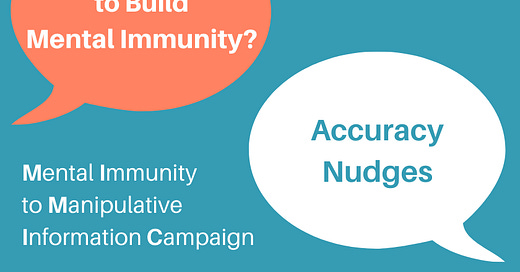Also called “accuracy prompts,” accuracy nudges are simple remarks encouraging people to seek accuracy rather than settle for merely appealing or convenient judgments.1 It is easy to mistake the usefulness of an idea for truth. When we come to rely on ideas that are useful but false, though, our thinking can go badly astray. “But is it true?” is a great way to remind students that usefulness does not guarantee truth. It’s also a reminder that, to think clearly and well, we need to check our claims for accuracy.
Applications
Point out that usefulness and truth are different things, and illustrate why it’s often a mistake to settle for convenient fiction. Going the extra mile for true beliefs often works out better in the long run.
Prompt students to raise their hand if they think such-and-such claim is true. After students respond, ask "But is it really true?" and “How can we find out?” Then find out together.
If a student makes a questionable claim, invite them to share their reasons or evidence. “Help us understand why we should rely on that claim as true.” "Is there an experiment or study that shows this?" When you nudge students to check the accuracy of their statements, it fosters a classroom culture of curiosity and accountability.
Notes
The concept of an accuracy nudge comes from research on how to improve (online) social networks.2 Given that the classroom functions as a unique social network, we believe accuracy nudges will prove useful to educators. Encouraging students to seek accuracy should help improve their evidence-based reasoning skills and cultivate a shared drive to seek truth. This shared interest in truth-seeking is characteristic of communities of inquiry, which will be a topic of focus in a future post!
Learn More
On the Efficacy of Accuracy Prompts Across Partisan Lines: An Adversarial Collaboration3
This is the 4th post in our “What Works” series for educators and researchers. We are open to incorporating feedback into these modules before we publish them on our website. Please comment on this post to provide suggestions. We are particularly interested in additional applications, resources, and readings. All constructive feedback is welcomed, even if we don’t add it to the finalized version.
Thank you!
In other news...
Prebunking Segment on 60 Minutes
CIRCE collaborator Sander van der Linden PhD of Cambridge University was featured in a segment on last night’s 60 Minutes Overtime episode to share about his work on prebunking, the topic of one of our previous posts.
Watch here:






